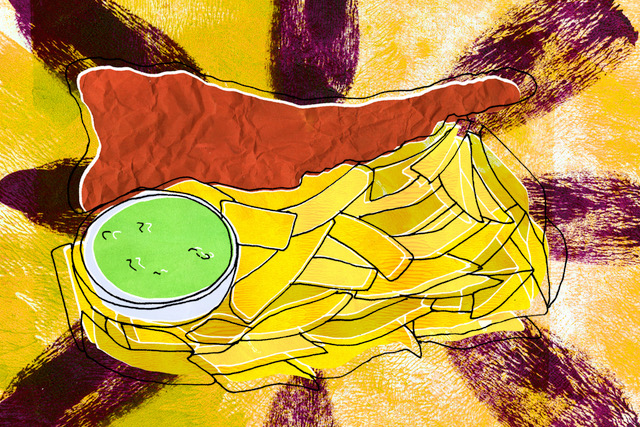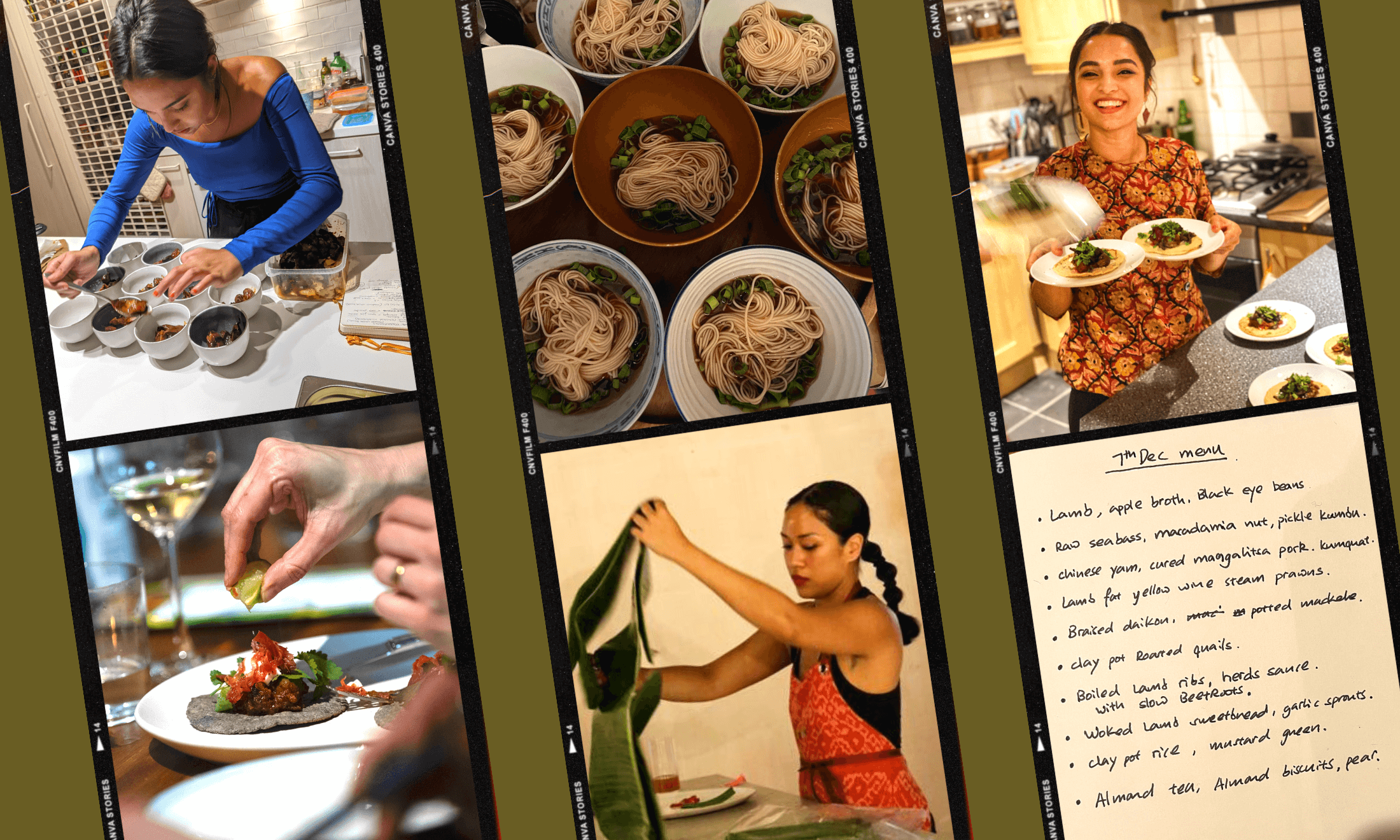
Illustration by Tessie Orange Turner
Fish and chips are uniquely British, and so is its hidden migrant history
Popularised by Jewish refugees, and once derided for being a smelly working-class dish, the chippy tea has a bigger story than you think
Sahar Shah
01 Dec 2020
“The queen’s favourite takeaway is fish and chips” proclaims Tatler. When she vacations at her castle in Balmoral, the queen sometimes finds herself gripped by a craving for the “nation’s favourite dish”, and a footman is dispatched to the nearby town of Ballater to procure it. The magazine, famed for its proximity to the habits of the everyman, seemed to be trying to tell us that in a way, the queen is just like every other Brit. Fish and chips are so embedded in Britain’s national identity that the National Federation of Fish Fryers (NFFF) says that “British soldiers identified each other during the D-Day landings by calling out ‘fish’ and the response (or password) was ‘chips’.”
So when Gary Lineker publicly thanked refugees for bringing fish and chips to Britain historically in September (to counter the UK government’s narrative that the refugees trying to enter the UK today are a threat to the nation), there was public resistance. This is our thing, said the angry crowd. In fact, this is us.
But the story of fish and chips in Britain is a migrant story (as Panikos Panayi outlines in his mouth-watering history Fish and Chips) with flavour notes that will be familiar to most “minority ethnic” people. And, while many white Brits might perceive this as a blow to British national identity, it actually tells a story of Britain that is more interesting, beautiful, and humane than any white nationalist myth.
Fried fish is believed to have been brought to Britain by Sephardic Jewish refugees in the late 1800s and many believe the first fish and chips shop was opened by the Ashkenazi Jewish immigrant Joseph Malin in London’s East End. Fried fish was largely associated with the Jewish community in Britain for most of the 1800s – an association that at the time went hand-in-hand with antisemitism. Panikos Panayi shows numerous recorded instances of people complaining about the “nauseous odour” associated with the fish and making disparaging associations between fried fish and the relatively poor regions of London in which these shops (and Jewish communities) were concentrated.
Arun’s family owns Heathcote Fish Bar
But as the 19th century progressed, fish and chips became associated with “Britishness” – possibly in contrast to the Italian, Chinese and Indian restaurants springing up in the 50s and 60s. Headlines like “It Takes a Stiff Upper Lip to Love Fish and Chips!” began popping up. By the 1950s the NFFF was leveraging the idea of Britishness in its marketing, referring to it as Britain’s “favourite food”. The Beatles attributed their success to it. What had begun as a dish looked down upon when purveyed by Jewish refugees was now referred to in headlines as a “Patriotic Food for Posh and Poor”.
But fish and chip shop ownership continued to be a vehicle for the ambitions of subsequent waves of migrants. John Walton traces the origins from primarily Jewish ownership in London’s East End to substantial Italian ownership in the early 1900s to Chinese, Greek Cypriot and South Asian ownership from the 1950s onwards. Frying is often an economic and social point of entry for new arrivals to the UK.
“I didn’t go to university but I wanted to make a success of myself – this was my road to success”
This was certainly the case for several chip shop owners in my town, Leamington Spa. “My father in law’s mum and dad came over for a better life, as a lot of people did after the Turkish invasion of Cyprus,” says Rob McKelby who owns Sealand Fish Bar with his Greek Cypriot wife Anna. “They’ve been in the fish and chip shop trade ever since. Back in the day, it was as soon as you could lift a bag of spuds, that’s it, you were working…old family stories involve people peeling the potatoes by hand, chipping them manually using a grid.”
“The Greek Cypriots were the ones who wanted to put the hours and effort in and wanted to make their lives successful,” explains Sarbjit, the Indian owner of Fish Fair. “My story was the same. I didn’t go to university but I wanted to make a success of myself – this was my road to success.”
Underlying this commitment to hard work is something that goes beyond the ideal of working hard in a modern capitalist sense (defined by productivity, productivity, productivity). Instead, it seems to be undergirded by a desire for self-ownership and strong relationships in the family and wider community.
“Instilled in the Sikh community is an ethos of establishing a sense of ownership over your own life,” says Bally, owner of a local icon, the diner-style red-tiled Tachbrook Fish Bar.
Each fish and chip shop owner I spoke to takes immense pride in sourcing the best possible fish available (generally Scottish cod) and spoke at length (off the record!) about their secret to perfect fish and chips (hint: Fish Fair’s Sarbjit suggests it shares a lot of cross-over with the science behind frying the perfect samosa). “You can’t really compare this to fast food,” says Bally. “In addition to fresh fish, we select the best type of potato, buy them fresh, peel them, chip them, fry them ourselves, monitor the standard. I’m never going to give you frozen fish. That’s not what McDonalds is doing.”
This desire for self-ownership seems to extend to an instinctive aversion to entanglements with corporations. Most take such pride in the crispness of their fish batter that they refuse to use apps like Just Eat and Deliveroo (and those that do use it have done so with reluctance as a result of lockdown restrictions). “We liked people coming in,” says Sarbjit. Arun, full-time employee (and son of the owner of) Heathcote Fish Bar, explains that the fees transferred to consumers through these apps are also off-putting to owners. “Fish isn’t exactly an inexpensive meal anymore as it is.”
In a world of increasing corporatisation, fish and chip shops also seem to move from family to family. Rob and Anna co-own their shop with Anna’s father (Anna was in fact born in the flat on top of Sealand Fish Bar), who owns his own shop in Coventry called Marina Fish Bar. Sarbjit purchased Fish Fair from a family friend. Tachbrook Fish bar was started 40 years ago by Greek migrants and passed on to Bally 13 years ago.
“Whoever takes this on next, it won’t be someone whose family is already established,” says Sarbjit. “It will be someone who’s hungry. Someone hungry for success will make a success of it.”
Chippies are a symbolic representation of how the lives of migrants and the British working class converge. John Walton explains that the dish itself came to be associated with the British working class in the 20th century, identified by journalists (and authors like Dickens and Orwell) with “slums and slum dwellers, with unpleasant smells and dubious hygiene” (again, smell and hygiene – the seemingly preferred methods of marginalisation deployed by the white British elite). Interestingly, a similar narrative seems to characterise the media and government’s current relationship with the chippy’s close relative, chicken and chip shops – a canvas onto which white anxieties about everything from knife crime to public health are projected.
“Whoever takes this on next, it won’t be someone whose family is already established. It will be someone who’s hungry for success”
Panikos’s book tells us that as each new wave of migrants entered the UK, set up fish and chip shops and attempted to settle, they were faced with resistance in various forms – ranging from physical violence to accusations that they were “monopolizing” the trade. As Chinese migrants began to establish “Chinese chippies” throughout the ‘60s and ‘70s, newspapers screamed things like “Chinese Shop Poses Threat to Friers”.
The pernicious othering that migrant fish/chip shop owners have faced historically continues to be directed at fish and chip shop owners today, though many owners will dismiss it. While Sarbjit says he has never really experienced racism in his shop, he says: “You get some people, even youngsters, that will make the odd comment – for example, someone the other day came in and said ‘it’s so hot today – but you must be used to that’. I thought, hang on, I’ve been here since 1962. I’m more used to British weather than anything else!”
Bally says: “What you’ve got to realise is that we grew up in the 70s. Your teacher was racist, your neighbours were racist – it was an in-your-face kind of thing. It’s not like that for my kids and for me now. Leamington’s a pretty nice town – every now and then you might get a remark, but I don’t think it’s malicious. It’s just ignorance.”
Diversity in fish and chip shop ownership has resulted in an astonishing, gorgeous range of regional chip shop specialities that form part of the bonds many Brits have to their hometowns. This was explored in a fantastic recent Vittles piece – try not to groan with longing as you read the authors’ nostalgic accounts of chips tossed in salt and pepper spice with Sichuan peppercorns and fried chicken bits, chips with tamarind sauce, and Jamaican patties and chips. Interesting new articulations of fish and chips continue to be introduced by people of colour.
“I was the first person in the UK to do vegan tandoori about five years ago,” says Vijay (who co-owns the UK’s first veggie chippy with his brother Gurmeet) with infectious enthusiasm. “Everywhere is trying to replicate those things now, but we pioneered this. We’ve created things like vegan Doner kebabs and vegan masala fish – grilled, topped with onions and a spicy sauce – it’s like a party in your mouth.” The Veggie Chippy is an incredible place. It looks exactly like a traditional chippy, but its vast menu is entirely vegetarian or vegan. It seems to be keeping many essential elements of fish and chips alive, though – in addition to its classic offerings (made accessible to vegetarians and vegans), it caters primarily to loyal customers in the local community – like many of the traditional chip shops I visited, customers seem to be able to order here just by walking in and nodding to the owners.
While surveys indicate that fish and chips are still indisputably a British icon, the future of its traditional shops is tenuous. “Mark my words,” says Bally. “In 10-15 years, chip shops in the UK will not be selling fish. It will be too expensive.”
Pride in their work keeps these owners shelling out for top quality Scottish cod, meaning they turn almost no profit on fish (relying on the margins on items like battered sausages and chips to make up the difference). “I’m charging £6 for a large cod now,” says Bally. “Some places charge £8 or £9. Who has got £9 to pay for a piece of cod?”

Heathcote Fish Bar, like many of the chippies I spoke to, gets fresh Scottish cod delivered daily.
The 20% VAT on hot food has been a particular bone of contention for fish and chip shop owners for some time now. The Covid-19 pandemic, is also, as Vijay from the Veggie Chippy put it, “crushing dreams” along with increasing competition from corporate fast-food chains and take-aways, and, of course: Brexit, which will impact everything from fish stocks to labour supply. “I had a job advert up for around three months when Nigel Farage was saying people were coming and stealing British jobs,” says Sarbjit. “Where are these people?”
Owners I spoke to, half of whose parents’ ran fish and chip shop themselves, recall queues that would “start to form” when the pubs shut at around 1 or 2am. “People would pile out and go straight to the chip shop. My father in law said he could sell 50 pies in an hour,” says Rob. Restrictions on late night selling, combined with pubs closing earlier now than in the past, make all this impossible now.
***
In a shock twist on Tatler’s initial story about the Queen’s love of takeaway fish and chips, the Queen’s private chef confessed: “The Queen wouldn’t really eat the fish fried in all that crispy rich batter – a little bit too much for her. She preferred a more refined fish and chips. The chips were all cut the same length – every one the same length, perfect rectangles.”
Are fish and chips a national lie, then? The historic PR mission to associate fish and chips with a British national identity is part of a national myth wound up with ideals of empire, queen and country. But: what if Britain is something better? What if it is actually like fish and chips – textured, hearty, multicultural, and gritty?
If this is the case, then Britain doesn’t need the exclusionary anti-migrant rhetoric forwarded by the likes of Priti Patel to protect its national identity: it needs close-knit and diverse local communities, support for small businesses, and stronger bonds between all of the above.
All the small things is a gal-dem series that takes a big look at the little details of everyday life that hold intriguing human interest stories and little known histories.









